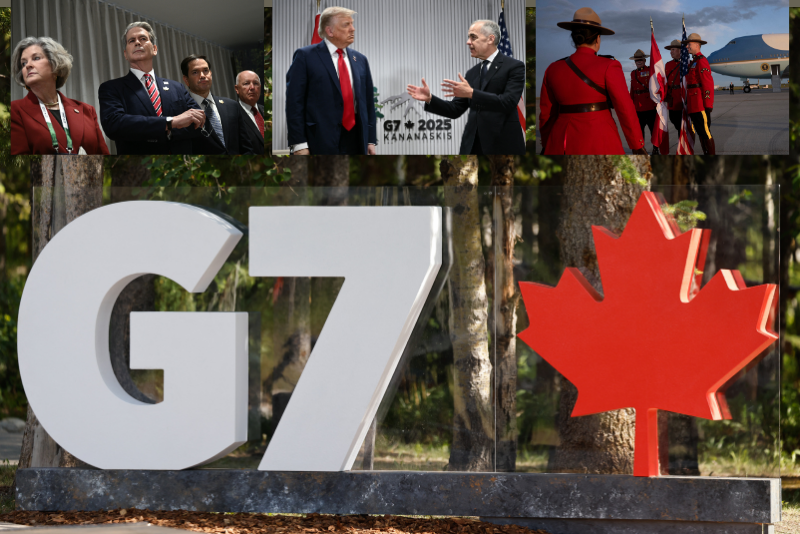


OAN Staff Brooke Mallory
11:54 AM – Monday, June 16, 2025
Leaders of the Group of Seven are convening in Canada, with global issues such as the escalating Israel-Iran conflict and U.S. tariffs dominating the agenda.
According to the Canadian press, the summit is also marked by diplomatic unease, as member nations seek to navigate potential disagreements and negative confrontations with U.S. President Donald Trump, who has previously suggested annexing the host country.
A YouGov survey from January 2025 had reported that 77% of Canadians were strongly or somewhat opposed to joining the U.S., with 15% being supportive. Nevertheless, Ipsos polling indicated that if offered U.S. citizenship and the ability to convert assets to U.S. dollars, support rose to about 30–43% depending on age—especially among 18–34-year-olds, of whom 43% would vote for annexation under those terms.
Canadian Prime Minister Mark Carney outlined his key objectives for the summit: enhancing “global peace and security,” advancing the development of critical mineral supply chains, and driving job creation.
However, international concerns over U.S. “protectionist” trade policies and ongoing conflicts in the Middle East and Ukraine are expected to overshadow much of the dialogue.
Meanwhile in the world, tensions in the Middle East intensified further overnight into Monday, as Israel and Iran exchanged more back-and-forth attacks, deepening a conflict that was reignited by an Israeli offensive launched on Thursday. The G7 leaders came out with a joint statement soon after.
“The G7 members unequivocally condemned Iran’s destabilizing actions, including its rapid advancement of uranium enrichment without credible civil justification, its facilitation of terrorism organizations and armed groups across the Middle East and Red Sea, its proliferation of ballistic missiles and drones, and its transnational repression and violation of fundamental human rights,” according to the U.S. Embassy in Italy.
One politician, German Chancellor Friedrich Merz, outlined his priorities for the summit. He emphasized that it is imperative to prevent Iran from acquiring nuclear weapons and he affirmed Israel’s right to self-defense — averting further regional escalation and “preserving space for diplomatic engagement.”
Iran has claimed that its nuclear program is peaceful. However, on June 12th, the IAEA Board of Governors formally found Iran non‑compliant with its NPT Safeguards Agreement, marking the first time that such a judgment has been made in two decades. This action also followed Iran’s failure to credibly explain uranium traces discovered at undeclared locations.
Iran’s Foreign Ministry, particularly spokesperson Nasser Kanaani, has argued that its enrichment efforts are strictly for civilian use and fully comply with the Non‑Proliferation Treaty (NPT) and International Atomic Energy Agency (IAEA) safeguards.
Other detractors of Iran’s nuclear program — including Israel, the U.S. government, and various nonproliferation experts — have continued to raise a number of concerns about Iran’s nuclear sites and future goals. Critics have pointed out Iran’s previous concealment of facilities, such as Natanz and Fordow, which were “only revealed through intelligence leaks or satellite imagery.” The nature of these sites have raised suspicions about its nuclear intentions.
Iran has also not consistently provided full access to inspectors or disclosed all its nuclear-related activities, and officials said last Thursday that it would soon open a third uranium enrichment site. Iran’s announcement regarding the enrichment site came after the United Nations (UN) nuclear watchdog agency ruled for the first time in two decades that Tehran had failed to comply with its nonproliferation obligations.
Meanwhile, global leaders at G7 are currently grappling with a range of pressing transnational challenges, including illegal immigration, deportations, narcotics trafficking, and the rapid advancement of emerging technologies — such as artificial intelligence (AI).
According to diplomats, “Canada ditched the idea of a traditional comprehensive joint communiqué and would issue chair summaries instead in an attempt to avoid a diplomatic disaster and maintain engagement with the U.S.,” Fox News reported.
A senior Canadian official told reporters that Ottawa’s priority is to emphasize tangible, collective actions that the G7 nations — Canada, France, Germany, Italy, Japan, the United Kingdom, and the United States — can undertake in unison.
“We have our trade deals. All we have to do is send a letter, ‘This is what you’re going to have to pay.’ But I think we’ll have a few, few new trade deals,” Trump stated.
A senior U.S. official stated on Friday that the forthcoming discussions would encompass a number of strategic priorities, including global trade and economic stability, critical mineral supply chains, transnational issues, — such as illegal immigration and narcotics trafficking, the impact of wildfires, international security dynamics, AI governance, and energy security.
“The president is eager to pursue his goals in all of these areas, including making America’s trade relationships fair and reciprocal,” the official said.
Stay informed! Receive breaking news alerts directly to your inbox for free. Subscribe here. https://www.oann.com/alerts
